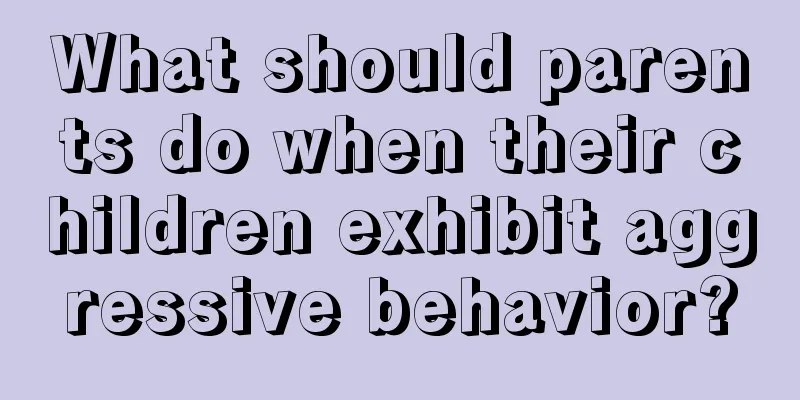What should parents do when their children exhibit aggressive behavior?

|
During the process of educating children, if the child shows aggressive behavior, it may be caused by genetics, family, or environment. At this time, parents should pay attention to the friends around the child and let the child watch less TV to prevent them from learning bad habits from others and engaging in bad behaviors. Causes of aggressive behavior in children Genetic factors: Experts have found that children who often have aggressive behavior mostly have aggressive parents. Since genetic factors have a greater impact than environmental factors, parents should always pay attention to their own behavior. Incompetent family pattern: Often lack of supervision, overreaction to children's behavior, and severe family pressure can lead to serious behavioral problems. Such children will have low self-esteem, and then become helpless, rude people, and prone to aggressive behavior. Personal characteristics: Some aggression is due to children's personal emotional experience. Lack of sympathy, poor social skills, lower than average IQ, and bad personality can all lead to bad behavior in children. Environmental factors: Children living in unsafe areas (some people take drugs or gamble), or in poor schools, often with friends with aggressive behavior, poverty, single parents, etc., are prone to abnormal behavior. Watching too much TV: Children who are addicted to TV lack communication with their parents and have bad eating patterns. Children who like cartoons and football game programs are more aggressive, and children will often imitate what they see. What to do if your child exhibits aggressive behavior Parenting style: Parents' parenting style plays an important role in correcting children's aggressive behavior in a timely manner. Teach your children how to deal with anger, negative emotions, and pay attention to their abnormal behavior. Appropriate discussion: Parents need to remain calm to deal with their children and discuss with them in a peaceful way. Tell your child the consequences of his behavior and that other children will not be willing to play with him if he continues to behave like this. Monitor the influence of friends: Friends and classmates play an important role in a child's life and they are likely to influence a child's behavior. If his friends have bad behavior, try to explain to the child that his friend's behavior is wrong. Guidance for children to be a good role model when they exhibit aggressive behavior: Children often imitate their parents' behavior, so try not to do things that will affect your children in a negative way. Stay calm and patient in front of your children and set a good example. Appreciate your children: Using positive discipline strategies such as appreciation and rewards will help reduce their aggression. Praise your children when they behave well, which will make them feel better and show positive behavior. |
<<: Will baby thrush heal on its own? Misconceptions about treating baby thrush
>>: What is the best material for baby sleeping bags? Top 5 fabrics
Recommend
What causes back pain during mid-pregnancy? What causes fetal arrest?
Many pregnant women will experience back pain dur...
How to regulate kidney deficiency in women and what are the symptoms
Before pregnancy, we must first pay attention to ...
Pre-pregnancy preparations and precautions
Pregnant women are the most beautiful, and pregna...
How to treat postpartum weakness? What supplements should I take for postpartum weakness?
For new mothers, they are very weak after giving ...
When is the best time to take Calcium? Can I take Calcium if I have high blood pressure?
Many people need calcium supplements because of l...
How long does it take for a scented candle to burn for the first time? What kind of material is good for scented candles?
Aromatherapy candles are a product that many peop...
Can pregnant women eat ginseng vegetables? What are the benefits of eating ginseng vegetables for pregnant women?
Ginseng vegetable is a nutritious vegetable. It c...
Is it normal for a newborn baby to fart and have diarrhea after breastfeeding? Is it normal for a newborn baby to have yellow diarrhea after breastfeeding?
For breastfed babies, mothers often observe their...
How much influence does a father have on his children? Is it important for a father to accompany his children?
Did you grow up with your father and mother by yo...
What should I do with the black line on my belly after giving birth? How long does it take for the black line on my belly to disappear after giving birth?
Postpartum mothers will face a series of problems...
What should I do if I eat crabs during breastfeeding? What seafood can't I eat during breastfeeding?
Mothers have to avoid certain foods during pregna...
Can baby's medicine be mixed into milk powder? Can medicine and milk powder be taken together?
As the saying goes, good medicine tastes bitter. ...
What should I do if my child's teeth haven't fallen out and new teeth have grown?
Children always lose their teeth, but this phenom...
How much vitamin C should pregnant women take a day? What will happen if pregnant women take too much vitamin C?
Supplementing vitamin C is very important for bot...
What color is normal breast milk? Which color of breast milk is most nutritious?
Mothers who have experienced breastfeeding know t...









